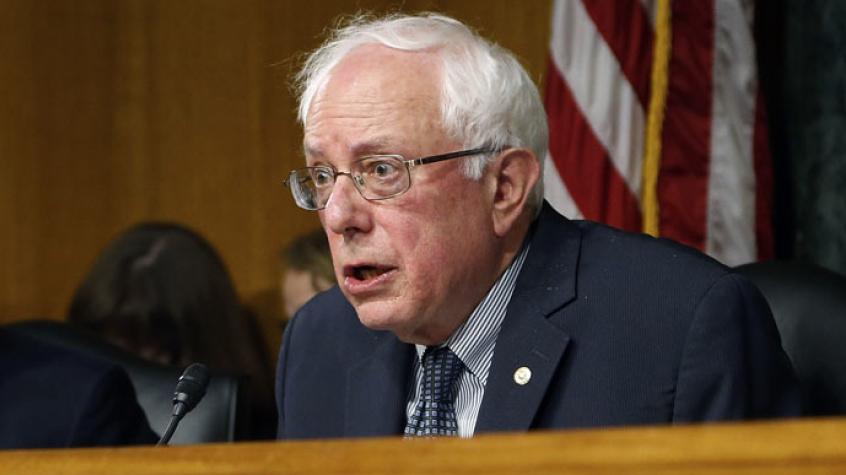
In 2006 I wasn't exactly "feeling the Bern" when I voted for Bernie Sanders in the US Senate Election for one of Vermont's two seats. He was simply the most appealing candidate when compared to a ludicrously wealthy Republican businessman and the representatives from the "Marijuana Party" and the "Anti-Bush Party".
As a disenchanted Republican clinging to my evangelical Christian faith in a state that actually isn't as liberal as many suspect, I was won over by Sanders' reputation for diligently governing by enacting policies that improved the quality of life for his constituents—especially the poor and working poor.
Comparing the Sanders campaign of 2006 to his bid for the Democratic nomination in America's 2016 presidential election, the main difference is the absence of BBQ chicken dinners at the local park. Rather, there are rallies with upwards of 20,000 people at a time.
The policy goals, communication style, and wild wisps of white hair are more or less the same as before. It's possible that the political landscape is finally ready for a figure like Sanders, even for a segment of the evangelical voting bloc that has typically belonged to Republicans.
As Sanders prepares to speak at the conservative bastion of Liberty University, his policies line up surprisingly well with the values of many millennial evangelical voters and, for good measure, Catholic teachings.
That isn't to say that the majority of evangelicals will defect from the Republican Party when they "feel the Bern". The majority will stay put.
Rather, Sanders is positioned to prompt a sizeable minority of Christian voters, especially Millennials, to do what seemed unthinkable at the height of the Tea Party movement in 2010: vote for a socialist.
Mind you, Sanders is a Democratic socialist, far from a Soviet Era style dictator and, arguably, different from a "pure" socialist in the first place. However, the Tea Party stoked the fears of Christians on the right by calling President Obama, a centrist Democrat if there ever was one, an extreme socialist.
The idea of an extreme socialist president called to mind images of Christian schools being shut down, preachers being tossed into jail, and laws banning the sale and reading of the Bible. Within this worldview, a larger socialist government is just a single piece of legislation away from banning Christianity altogether in America.
When Federal Marshals jailed county clerk Kim Davis for refusing to follow the Supreme Court's ruling to issue same sex marriage licenses, she became the sign of what's coming to America when "big government" goes out of control persecuting Christians.
Today, Sanders bears the label of big government socialist proudly. In fact, he'd probably say, "Yeah, but..." and then go on a tirade about fixing income inequality, bringing jobs back to America, raising the minimum wage, addressing climate change, and repairing our infrastructure. The terror of five years ago has become a non-story with Sanders who would rather rant about policy than argue with culture warriors.
As Sanders doggedly presses forward by focusing on what he will do rather than what his opponents can't, he stands to at least win a hearing among evangelical voters, especially the particularly large Millennial cohort in America that leans strongly Democrat even if evangelicals as a whole remain majority Republican.
Sanders won't win many points among the bulk of evangelical voters since he won't ban abortion, but his proposal to expand health care would put a significant dent in abortions by providing wider access to contraception (a proven policy even in America) and abortion isn't a make or break issue among younger evangelicals. His vocal opposition to the Iraq War appeals to the evangelical pacifists and opponents of militarism. While Sanders has long supported same sex marriage, many younger evangelicals simply aren't galvanized by this issue. Rather, they're concerned about finding affordable healthcare, finding better jobs, and caring for God's creation. Most importantly, they want the government to help.
For evangelicals concerned about social justice issues, it's hard to ignore income inequality, the need to bring manufacturing jobs back to America's impoverished neighborhoods, and the need to increase the minimum wage. For voters prioritizing these issues, Sanders and his version of Democratic socialism may lose its frightening red veneer.
At this point in the election Sanders is still a long shot in a volatile primary season. Good heavens, Donald Trump is still the Republican front runner, and we can only pray that won't last. A lot can change in a month or two—please?
However, if Sanders does manage to keep his campaign alive, he may provide an important turning point in evangelical demographics as the values of younger voters unfazed by a socialist further carve up an already fragmented movement. Perhaps he'll even convince Republican strategists that you can't win an election by rallying the evangelical camp with homophobia, xenophobia, and militarism.
Ed Cyzewski (MDiv) is the author of Coffeehouse Theology, A Christian Survival Guide, and The Good News of Revelation. He writes at www.edcyzewski.com.









